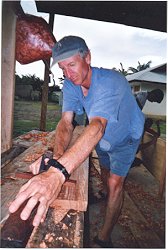

|
DILI, December 2000.
IT'S TAKEN ME A while to discover a role for myself at Futo. Most people I have talked to have had similar experiences even if they are doing something as straight forward as teaching English. During my first three weeks I've done no building except for two sawstools and a short ladder. Yet, I'm beginning to feel like part of the team, albeit a member who is a foot taller, pale of skin, doesn't smoke, is not a Catholic and is the only one wearing earmuffs around the power tools.
My gawd, a two inch long cockroach is making its way down the inside of my door. I hit it with my jandal and now it's dragging itself around in a circle. Eeee, they don't kill easily.
Anyway, back to Futo. When I got to work yesterday, the carpentry team was going full tilt. I asked if they had a new contract and was told the nuns had asked had them to make ten desks and 25 chairs.
The nuns are Australians Rita and Michelle who come and teach English four mornings a week. So when they arrived I said hello and that the men were busy working on their order. Rita looked horrified. She said she hoped not because they hadn't settled on a price or even the design. She explained that she was applying to Timor Aid who might support the purchase of tables and chairs for the Futo women's sewing workshop, but nothing was settled.
I went back to the carpenters and discovered that the tables they had started were not what Rita wanted and they stopped what they were doing. I did a drawing to help clarify things and then costed the materials. I then had a meeting with Meno, the director, Fernando the head carpenter and Liandro who is in charge of some things and has the best English, to explain my costing. Eventually we settled on a price with quite a good profit margin and arranged to meet with Rita at 8:30 the next morning.
 The
timber they make most of the furniture from is a red Timorese hardwood
brought in from Suai. In bulk, it cost Futo 13,750Rp (about $NZ4) per lineal
meter of 8"x1 1/2". It is beautiful timber, very strong but is very
roughly chainsaw milled. That afternoon I took turns with three other men planing 12mm off the
entire face of one of these hardwood boards with a two foot long wooden
smoothing plane. They have a power planer, but there had been no power at
the shed all day. It's amazing they kept working with the hand plane,
knowing that when the power does come on, they would accomplish an
afternoon's work in ten minutes.
The
timber they make most of the furniture from is a red Timorese hardwood
brought in from Suai. In bulk, it cost Futo 13,750Rp (about $NZ4) per lineal
meter of 8"x1 1/2". It is beautiful timber, very strong but is very
roughly chainsaw milled. That afternoon I took turns with three other men planing 12mm off the
entire face of one of these hardwood boards with a two foot long wooden
smoothing plane. They have a power planer, but there had been no power at
the shed all day. It's amazing they kept working with the hand plane,
knowing that when the power does come on, they would accomplish an
afternoon's work in ten minutes.
I found the meeting the next morning entertaining. First we had to find a suitable room with enough chairs. Rita brought a Bahasa Indonesia interpreter, to minimise the vagaries, which was a very good thing. One of Rita's English students is Adriana, who is also the Futo secretary and Maria the treasurer, were there as well. Meno was busy with the carpenter until Rita, who was getting impatient with him, told Liandro that the meeting would be off if Meno didn't come immediately.
Eventually the six us sat down and within half an hour came to an understanding on the design and price, all of which was translated between Bahasa Indonesian and English but recorded in Tetum.
After, I asked Rita, who would own the chairs and tables. She said, oh, they will. So this contract that Futo budgeted to make a profit on is for tables and chairs which they will own.
At first this struck me as rather audacious until I realised you have to look at it in context. Look at it this way: you perceive a lack of skills in you community so you decide to get start a trust to provide vocational skills which people are not going to be able to pay for. What you have are 200 keen members and two buildings with no furniture, no floor coverings, no lockable, weatherproof or insect resistant windows, no doors, no power points or light fixtures and no water. And no money. That's what you have to start with. Now go for it, make a difference in your community.
And, like I said, no one pays Futo to offer its training nor does it charge for them. To members it gives away English and Portuguese classes, provides sewing machine skills and carpentry tutorage all for free. Transpose this to NZ and the community group would get a grant to provide these services and the overhead costs would be part of the contract price. Paying people to make their own furniture so they can do their training is just a different way of getting to the same point. Instead of the money coming from WINZ or the Ministry of Education, it comes from Timor Aid or Ausaid or some donor organisation.
